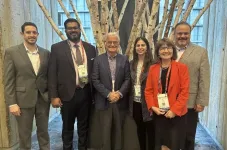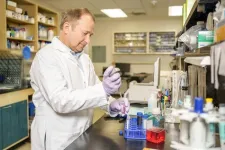(Press-News.org) DETROIT (December 13, 2023) – Published results of a large, national heart attack study show that patients with a life-threatening complication known as cardiogenic shock survived at a significantly higher rate when treated with a protocol developed by cardiologists at Henry Ford Health, in collaboration with 80 hospitals nationwide.
Cardiogenic shock is a critical condition in which the heart is unable to pump enough blood to sustain the body’s needs, depriving vital organs of blood supply. This can cause those organs to eventually stop functioning. The typical survival rate of this deadly complication during a heart attack has historically hovered around 50%.
Led by a cardiology research team based at Henry Ford Hospital in Detroit, the National Cardiogenic Shock Initiative (NCSI) results demonstrate a survival rate of 71% in patients whose heart attack was complicated by cardiogenic shock and were treated with the protocol. Final results from the national study published in the Journal of the American Heart Association were achieved from looking at 406 patients from hospitals across 29 states.
“The National Cardiogenic Shock Initiative is the largest prospective study of therapy for severe heart attack cardiogenic shock done in the United States in the past two decades,” said William O’Neill, M.D., medical director emeritus of Henry Ford’s Center for Structural Heart Disease and principal investigator of the study. “The impressive results from our study in the U.S. have also prompted the use of our protocol in Japan where they are experiencing similar great outcomes.”
The treatment algorithm, available at henryford.com/cardiogenicshock, emphasizes quick recognition of the condition, then inserting a temporary straw-sized pump into the heart to keep blood flowing throughout the body. The Impella® heart pump, an FDA-approved device, is inserted through a catheter in the groin as soon as the patient arrives at the hospital. Doctors then treat the cause of the heart attack, either inserting a stent, removing a clot or taking other necessary action.
The NCSI study involved cardiologists at both community hospitals, where many patients with heart attack first present, and large academic centers. Of the more than 1,100 patients who were screened, 406 were enrolled into the study. The study also isolated predictive markers that indicate a patient’s condition, an invaluable tool in determining treatment.
The NCSI participating hospitals agreed to treat patients who presented with acute myocardial infarction and cardiogenic shock using a standard protocol, which involved rapid initiation of mechanical circulatory support (MCS) with an Impella 2.5® or Impella CP® heart pump, along with right heart catheterization to assess status of right and left ventricular heart function. Patients were enrolled between July 2016 and December 2020.
“The study results show remarkable survival, the highest we’ve seen in any study so far,” said Babar Basir, D.O., Director of Acute Mechanical Circulatory Support at Henry Ford Health and principal investigator of the study. “The results show that we now have therapy that can save lives and improve outcomes for people who’ve had severe heart attacks and we haven’t had results like these in 20 years. The protocol has already saved many lives and will continue to do so as more hospitals adopt its principles.”
In the U.S., approximately 80,000 people are diagnosed with cardiogenic shock as a result from a heart attack each year according to data from a published study that looked at a 15-year trend from 2004 to 2018.
Dr. O’Neill will continue to lead research in the next NCSI phase in an upcoming study titled Recover IV Trial.
"Implementing this protocol has truly been a joint effort with hospitals that have experienced the devastating burden of cardiogenic shock,” said Sarah Gorgis, M.D., a cardiologist at Henry Ford Health and co-researcher for the study. “Our work has just begun, but this protocol gives us hope since we have seen first-hand the impact it can make on survival."
“The NCSI initiative was critically important. It changed how we approach the management of patients with cardiogenic shock, and with those changes, we witnessed improvements in survival , for the first time in decades,” said Herb Aronow, M.D., medical director of Heart & Vascular Services at Henry Ford Health.
“Bringing together 80 different sites to investigate an innovative treatment protocol for Acute myocardial infarction complicated by cardiogenic shock is an incredible accomplishment by our NCSI team and heralds highly promising new approaches to improving outcomes in this challenging patient population,” said Henry Kim, M.D., Division Head of Cardiology at Henry Ford Health.
To learn more about the NCSI, visit henryford.com/cardiogenicshock.
###
MEDIA CONTACT: mediarelations@hfhs.org
ABOUT HENRY FORD HEALTH
Serving communities across Michigan and beyond, Henry Ford Health is committed to partnering with patients and members along their entire health journey. Henry Ford Health provides a full continuum of services – from primary and preventative care, to complex and specialty care, health insurance, a full suite of home health offerings, virtual care, pharmacy, eye care and other healthcare retail.
It is one of the nation’s leading academic medical centers, recognized for clinical excellence in cancer care, cardiology and cardiovascular surgery, neurology and neurosurgery, orthopedics and sports medicine, and multi-organ transplants. Consistently ranked among the top five NIH-funded institutions in Michigan, Henry Ford Health engages in more than 2,000 research projects annually. Equally committed to educating the next generation of health professionals, Henry Ford Health trains more than 4,000 medical students, residents and fellows every year across 50+ accredited programs.
With more than 33,000 valued team members, Henry Ford Health is also among Michigan’s largest and most diverse employers, including nearly 6,000 physicians and researchers from the Henry Ford Medical Group, Henry Ford Physician Network and Jackson Health Network.
The health system is led by President and CEO Robert G. Riney and serves a growing number of customers across 250+ locations throughout Michigan including five acute care hospitals, two destination facilities for complex cancer and orthopedics and sports medicine care, behavioral health, primary care and urgent care centers.
END
Researchers from Northwestern University, University of Pennsylvania, and University of Colorado published a new Journal of Marketing study that proposes abandoning null hypothesis significance testing (NHST) as the default approach to statistical analysis and reporting.
The study, forthcoming in the Journal of Marketing, is titled “‘Statistical Significance’ and Statistical Reporting: Moving Beyond Binary” and is authored by Blakeley B. McShane, ...
Oceans cover most of Earth’s surface and support a staggering number of lifeforms, but they’re also home to a dilute population of uranium ions. And — if we can get these particular ions out of the water — they could be a sustainable fuel source to generate nuclear power. Researchers publishing in ACS Central Science have now developed a material to use with electrochemical extraction that attracts hard-to-get uranium ions from seawater more efficiently than existing methods.
Nuclear power reactors release ...
The vast majority of older adults – 83% -- think health insurers should cover medications that can help people with obesity manage their weight, a new poll of people age 50 to 80 finds.
Nearly as many -- 76% -- believe Medicare should cover these drugs, which it cannot currently do under law, according to the new results from the University of Michigan National Poll on Healthy Aging.
A law passed in 2003 prohibits Medicare from covering weight loss medications, though it can cover drugs to help people with Type 2 diabetes manage their weight. Medicaid covers obesity medications ...
With an estimated 1.9 million new cases and more than 600,000 deaths each year, cancer remains the second most common cause of death in the U.S., trailing only heart disease. And while there are more than 200 types of cancer, the abnormal synthesis of a protein known as STAT3 is unique to the majority of tumors.
STAT3 is known as a transcriptional regulator, which means it regulates the expression of several genes. In fact, STAT3 is associated with approximately 70% of all human tumors and is responsible for uncontrolled cell growth and disease progression.
To investigate new approaches to inhibit STAT3 and develop new cancer treatments, the National Institutes of Health-National ...
Flat-faced dog breeds are popular all over the world. In the USA and in Hungary, the French Bulldog is currently the most common breed. However, their popularity comes at a high cost in terms of health: shortened skulls are associated with deteriorative brain morphology changes, breathing difficulties and sleep problems. According to recent findings by Hungarian researchers, flat-faced dogs sleep more because their breed-specific sleep apnea increases daytime sleepiness, their REM sleep phase is longer than ...
The University of Texas at San Antonio today announced the selection of David Brown as the new executive director of its National Security Collaboration Center (NSCC) and professor of practice. Brown will join UTSA with decades of experience leading collaborative research and development ecosystems supporting U.S. national defense strategies.
Brown is a trusted, well-connected leader in civilian and military communities nationwide who has especially strong relationships within U.S. Department of Defense (DoD) organizations, laboratories and commands and has gained national recognition for his transformative leadership in federal research ...
Studies on sustainability inevitably touch on food-related topics like food security, culinary heritage, and the sustenance of vulnerable people. Social sustainability is one of the three pillars of sustainability, alongside environmental and economic sustainability, and has become a pivotal topic in various research fields. It includes concerns about social justice, resource distribution and recognition, and political participation of marginalized groups at the local community level.
Very few studies of social sustainability have looked at urban foodways in terms of social and cultural infrastructure. More often than not, scholars in Japan have ...
The transition to a society without fossil fuels means that the need for batteries is increasing at a rapid pace. At the same time, the increase will mean a shortage of the metals lithium and cobalt, which are key components in the most common battery types. One option is a sodium-ion battery, where table salt and biomass from the forest industry make up the main raw materials. Now, researchers from Chalmers University of Technology, Sweden, show that these sodium-ion batteries have an equivalent climate impact as their lithium-ion counterparts – without the risk of running out of raw materials.
"The materials ...
Research Highlights:
An analysis of death certificate data from 1999 to 2020 showed a decline in deaths related to infective endocarditis throughout most of the United States yet found an alarming increase of 2%-5% among adults ages 25-44.
There was a notable increase in the diagnosis of substance use disorder among the young adults with infective endocarditis listed as the underlying cause of death.
Three states at the epicenter of the opioid crisis— Kentucky, Tennessee and West Virginia — had significant increases in death rates related to infective endocarditis.
Embargoed until 4 a.m. CT/5 a.m. ET Wednesday, Dec. 13, 2023
DALLAS, Dec. 13, 2023 — ...
Smartwatches can help physicians detect and diagnose irregular heart rhythms in children, according to a new study from the Stanford School of Medicine.
The finding comes from a survey of electronic medical records for pediatric cardiology patients receiving care at Stanford Medicine Children’s Health. The study will publish online Dec. 13 in Communications Medicine.
Over a four-year period, patients’ medical records mentioned “Apple Watch” 145 times. Among patients whose medical records mentioned ...






